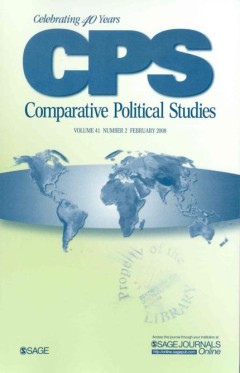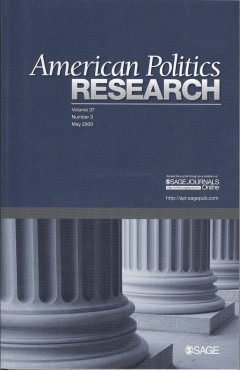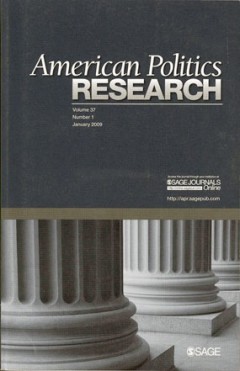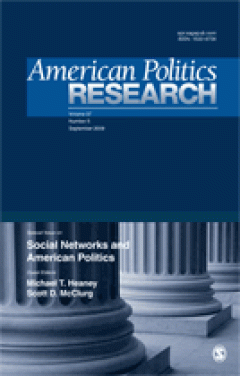Filter by

Are Mapmakers Able to Target and Protect Congressional Incumbents?: The Insti…
Can those in charge of redistricting foster electoral competitiveness by targeting some congressional incumbents while protecting others from potent competition? We provide an answer by presenting the dynamic redistricting thesis, which holds that the type of redistricting plan and the time passed since its enactment affect the emergence of high-quality congressional candidates. We demonstrate …
- Edition
- Vol. 37, No. 6, November 2009.pp. 955-982
- ISBN/ISSN
- 1532-673x
- Collation
- -
- Series Title
- American Politics Research
- Call Number
- -

Political Accountability and the Room to Maneuver: A Search for a Causal Chain
Many studies of the room to maneuver make no provision for popular evaluation of policy. They assert rather than demonstrate popular satisfaction with policy choices and macroeconomic outcomes. The authors present a framework that explicitly models channels for popular preferences to influence policies and outcomes. Results for economic policy making in Britain do not support the room to maneuv…
- Edition
- Vol. 41, No. 9, Page 1212-1239
- ISBN/ISSN
- 00104140
- Collation
- -
- Series Title
- Comparative Political Studies
- Call Number
- -

Proclaiming Trade Policy: "Delegated Unilateral Powers" and the Limits on Pre…
This article examines presidential proclamations on trade policy, a category of presidential unilateral power that we call delegated unilateral power that is used frequently in creating or modifying trade policy, between the period 1974 and 2006 and tests the boundaries of the explanations predicted by the unilateral powers literature. We also find that the use of proclamations on trade policy …
- Edition
- Vol. 37, No. 6, November 2009.pp. 1003-1023
- ISBN/ISSN
- 1532-673x
- Collation
- -
- Series Title
- American Politics Research
- Call Number
- -

Crisis in the Eye of the Beholder: Economic Crisis and Partisan Politics in L…
This article analyzes the interaction between economic crises and partisan politics during International Monetary Fund program initiation in Latin America in the 1980s and Eastern Europe in the 1990s. The author argues that economic crises are at least in part in the eye of the beholder, and therefore policy responses reflect the interaction between crisis intensity and the government's partisa…
- Edition
- Vol. 41, No. 9, Page 1179-1211
- ISBN/ISSN
- 0010-4140
- Collation
- -
- Series Title
- Comparative Political Studies
- Call Number
- -

The Effect of Local Political Context on How Americans Vote
Neighborhood context could condition voting decisions, but systematic investigation of whether (how) the traits of a given locale shape individual voting decisions is sparse. We explore the possibility that local partisan balance affects turnout and the use of convenience voting in particular. Using comprehensive registered-voter lists from four swing states in the 2002 and 2006 elections, we f…
- Edition
- Vol. 37, No. 6, November 2009.pp. 1088-1115
- ISBN/ISSN
- 1532-673x
- Collation
- -
- Series Title
- American Politics Research
- Call Number
- -

Ideas in Two-Level Games: The EC—United States Dispute Over Agriculture in …
In 1992, the United States and the European Community (EC) reached an agreement on the Uruguay Round Agreement of Agriculture (URAA). A comparison of the EC's and the United States's initial agricultural proposals with the final agreement shows that the specific commitments agreed to reduce agricultural support and protection went a long way to accommodate EC agricultural interests. However, th…
- Edition
- Vol. 41, No. 9, Page 1266-1289
- ISBN/ISSN
- 00104140
- Collation
- -
- Series Title
- Comparative Political Studies
- Call Number
- -

Delegation and Discretion in Anticipation of Coalitional Drift
If legislators are sensitive to coalitional drift, they must perforce be forward looking. In this article, we propose that legislators anticipate change in government�and any associated coalitional drift. That is, legislators recognize that the government could move from unified to divided or divided to unified. As such, how legislators structure an agency�s discretion may be affected by the cu…
- Edition
- Vol. 37, No. 6, November 2009.pp. 983-1002
- ISBN/ISSN
- 1532-673x
- Collation
- -
- Series Title
- American Politics Research
- Call Number
- -

Punctuated Budgets and Governors’ Institutional Powers
State budgets are flexible: In the same year, some budget categories dramatically rise or fall, whereas others closely follow the previous year�s appropriation. Public policy scholars label a budget that contains mainly small scale changes interspersed with dramatic fluctuations as punctuated. This research seeks to identify the determinants of these punctuated budgets in the American states. W…
- Edition
- Vol. 37, No. 6, November 2009.pp. 1116-1138
- ISBN/ISSN
- 1532-673x
- Collation
- -
- Series Title
- American Politics Research
- Call Number
- -

Value Preferences and Ideological Structuring of Attitudes in American Public…
In this study, we investigate four attitudinal structures (including liberal, conservative, and libertarian configurations) associated with two ideological dimensions among American voters and demonstrate that these attitudinal structures are related in expected ways to differential preferences for the values of freedom, order, and equality/caring. Liberals are inclined to trade freedom for equ…
- Edition
- Vol. 37, No. 6, November 2009.pp. 1048-1087
- ISBN/ISSN
- 1532-673x
- Collation
- -
- Series Title
- American Politics Research
- Call Number
- -

Economic Reforms and Democracy: Evidence of a J-Curve in Latin America
This article explores the relationship between economic reforms and democracy in Latin America between 1970 and 1995. Existing theories suggest divergent effects across time horizons. The implementation of reforms� economic liberalization�may initially destabilize democracy due to popular backlash or overzealous reformers' usurpation of democratic institutions. However, the potential outcome of…
- Edition
- Vol. 41, No. 10, October 2008. Page 1398-1426
- ISBN/ISSN
- 00104140
- Collation
- -
- Series Title
- Comparative Political Studies
- Call Number
- -

Explaining the Dominance of Legacy Unions in New Democracies: Comparative Ins…
The continued dominance of legacy unions�state-backed unions inherited from the previous nondemocratic regime�has received little scholarly scrutiny. Through an analysis of Indonesia, this article presents a focused theoretical framework for analyzing the staying power of legacy unions and the strategies they pursue to maintain their dominance. The author argues that the capacity of legacy unio…
- Edition
- Vol. 41, No. 10, October 2008. Page 1371-1397
- ISBN/ISSN
- 00104140
- Collation
- -
- Series Title
- Comparative Political Studies
- Call Number
- -

Electoral and Mechanical Causes of Divided Government in the European Union
Voters who participate in elections to the European Parliament (EP) apparently use these elections to punish their domestic governing parties. Many students of the EU therefore claim that the party�political composition of the Parliament should systematically differ from that of the EU Council. This study shows that opposed majorities between council and parliament may have other than simply el…
- Edition
- Vol. 41, No. 10, October 2008. Page 1349-1370
- ISBN/ISSN
- 00104140
- Collation
- -
- Series Title
- Comparative Political Studies
- Call Number
- -

Policy Concertation in Europe: Understanding Government Choice
This article focuses on the European governments' decision to involve unions and employers in the design and implementation of public policy. Based on new measures of the phenomenon, the authors argue that between 1974 and 2003, no convergence on a pluralist model of policy formation is visible. They then use these measures to identify and analyze the clearest cases of adoption or demise of con…
- Edition
- Vol. 41, No. 10, October 2008. Page 1323-1348
- ISBN/ISSN
- 00104140
- Collation
- -
- Series Title
- Comparative Political Studies
- Call Number
- -

Context-Sensitive Inquiry in Comparative Judicial Research: Lessons From the …
Research on the behavior of the Namibian judiciary highlights the importance of context-sensitivity in comparative courts research. Drawing from strategic understandings of judicial behavior, the analysis examines the extent to which political influences are affecting the behavior of judges in Namibia. The findings indicate that, for the most part, Namibia's judges have exercised high levels of…
- Edition
- Vol. 41, No. 11, November 2008. Page 1515-1540
- ISBN/ISSN
- 0010-4140
- Collation
- -
- Series Title
- Comparative Political Studies
- Call Number
- -

What You See and What You Get: Pitfalls and Principles of Nested Analysis in …
In a recent contribution to this journal, Munck and Snyder found that many studies suffer from a deficient application of qualitative and quantitative methods. They argue that the combination of small-n and large-n analysis represents a viable method for promoting the production of knowledge. Recently, Evan Lieberman proposed nested analysis as a rigorous approach for comparative research that …
- Edition
- Vol. 41, No. 11, November 2008. Page 1492-1514
- ISBN/ISSN
- 00104140
- Collation
- -
- Series Title
- Comparative Political Studies
- Call Number
- -

Social Cleavages and the Number of Parties: How the Measures You Choose Affec…
This article explores the issues surrounding the operationalization and measurement of social cleavages in a large-N context from the perspective of the party systems literature. It first highlights the difficulty of measuring the concept, which it argues has impeded hypothesis testing, and suggests strategies for improving upon existing measures. It then demonstrates that the conclusions we dr…
- Edition
- Vol. 41, No. 11, November 2008. Page 1439-1465
- ISBN/ISSN
- 0010-4140
- Collation
- -
- Series Title
- Comparative Political Studies
- Call Number
- -

When Do Votes Count?: Regime Type, Electoral Conduct, and Political Competiti…
The effects of electoral systems have been tested recently in Africa, raising several questions: Are the systematic effects of electoral rules the same across regime types? Does the conduct of elections affect the process of strategic coordination between voters and parties? The literature to date has not considered these issues and also analyzes elections in settings where a crucial set of its…
- Edition
- Vol. 41, No. 11, November 2008. Page 1466-1491
- ISBN/ISSN
- 0010-4140
- Collation
- -
- Series Title
- Comparative Political Studies
- Call Number
- -

Diverging Developments in Wage Inequality: Which Institutions Matter?
This article investigates how a particular wage-bargaining institution mitigates pressures from growing international competition and new production techniques and affects the degree of wage inequality growth. The extent to which industry-wide wage minima (wage scales) cover both higher and lower skilled workers affects developments in inequality. A series of cross-sectional time-series analyse…
- Edition
- Vol. 41, No. 12, December 2008. Page 1551-1582
- ISBN/ISSN
- 0010-4140
- Collation
- -
- Series Title
- Comparative Political Studies
- Call Number
- -

Representation, Corruption, and Subjective Well-Being
This study examines the effect of corruption and representation on people's subjective well-being. Using cross-national data from 68 countries and survey data from 16 European democracies, the analysis demonstrates that people report higher levels of subjective well-being when (a) their governments perform well (i.e., are clean rather than corrupt) and (b) the party of their choice is in power.…
- Edition
- Vol. 41, No. 12, December 2008. Page 1607-1630
- ISBN/ISSN
- 0010-4140
- Collation
- -
- Series Title
- Sage Publishing
- Call Number
- -

Politics as Usual or Bringing Religion Back In?: The Influence of Parties, In…
This article explains the variation of embryo research laws in the Western world. A quantitative analysis shows that theories of partisan influence, institutions, and economic interests are ill suited to explain this variation. Only when cultural factors are considered can the variation be explained. Catholic societies legislate more strictly, and the Catholic Church is an influential actor. Th…
- Edition
- Vol. 41, No. 12, December 2008. Page 1631-1656
- ISBN/ISSN
- 0010-4140
- Collation
- -
- Series Title
- Comparative Political Studies
- Call Number
- -
 Computer Science, Information & General Works
Computer Science, Information & General Works  Philosophy & Psychology
Philosophy & Psychology  Religion
Religion  Social Sciences
Social Sciences  Language
Language  Pure Science
Pure Science  Applied Sciences
Applied Sciences  Art & Recreation
Art & Recreation  Literature
Literature  History & Geography
History & Geography